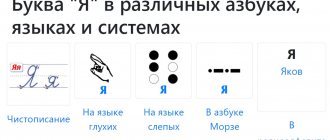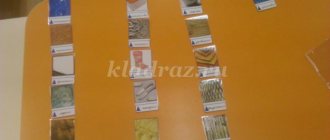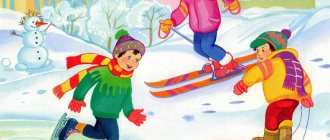Winter Words: Levels 1-2
LIST OF ALL LEVELS OF THE GAME “WINTER WORDS”
Below you will find answers to the game “Winter Words” for phones, smartphones and tablets with the Android system from the developer Second Gear Games. You need to find all the words in the list using the photo as a hint. Look at the picture and guess all the words depicted on it. When all the answers are found, the next level will open! If you find it difficult to complete any task, then you can find answers to the game “Winter Words” on our game portal Branto Ru. We also invite you to our groups: VKontakte or Odnoklassniki, where they will definitely help you with answers to any games.
How cold is it? How does the snow crunch under your feet? We have compiled a large list of English words that will help you describe winter nature and will be useful on your walk.
- Let's go for a walk! - Let's go for a walk!
- It's cold outside. — It is cold outdoors.
- Put on your hat! - Put your hat on!
- mittens
- knitted scarf – muffler
- Hold your mom's hand! — Hold Mom's hand!
- Snowing. — It is snowing.
- Snow is cold. - The snow is cold.
- melting snow
- white snow
- fluffy snow
- snowflake
- Look how beautiful the snowflake is! — Look, what a beautiful snowflake!
- Slippery! - It is slippery!
- Carefully! - Look out!, with care!, careful!, be careful!, watch out!
- Don't slip! - Don't slip!
- Be careful, don't fall! - Be careful, don't fall!
- Don't cry, get up! — Don't cry, get up!
- Are you hurt? — Have you hurt yourself?
- hoar frost
- The ice shines. - Ice glitters.
- Frost bites. - Frost bites.
- severe frost
- hard frost
- terrible frost
- frost-bound
- Frost covered the puddles. — Puddles are frost-bound.
- Frost bound the lake (river). — Lake (river) is frost-bound.
- to freeze - to freeze
- Are you cold? — Aren't you cold?
- Jump! - Jump!
- Keep warm! - Warm [yourself] up!
- snowman
- Look, the children are making a snowman! — Look, children are making a snowman!
- Let's build a snowman! — Let's make a snowman!
- head
- body
- The carrot will be the nose. — This carrot will make a nose.
- We will make a hat from a bucket. - The bucket will make a hat.
- little black eyes
- twigs
- Trees in the snow. — Trees are in snow.
- fir-tree
- cone - cone
- cold wind
- frosty air
- snowball
- play snowballs - to play snowballs
- sled - sledge
- sledding - to sled(ge)
- Let's go sledding! - Let's sledge!
- Get on the sled! — Sit down on the sledge!
- skis
- run (walk) on skis - to ski
- to skate - to skate, to go skating
- snowdrift
- icicle
- Don't lick the icicle! — Don't lick the icicle!
- You can’t lick an icicle - you’ll catch a cold in your neck! - You must not lick the icicle - you will catch cold!
- birds
- The birds are cold and hungry. — Birds are cold and hungry.
- Let's feed the birds! - Let's feed the birds!
- crumbs
- Some birds fly away to warmer climes. — Some birds fly south.
- These are city birds. — These are city birds.
- They do not fly away for the winter. — They don't fly away for the winter.
- squirrel
- The squirrel lives in a hollow. — Squirrel lives in a hollow.
- melt - to melt
- In spring the snow will melt. - In spring the snow will melt.
We thank the Sun portal for the material!
Glossary for The Snowy Day (Ezra Keats) from the Bilingual Child Project:
- snow had fallen (snow is falling) - snow has fallen (snow is falling). This expression is interesting because, contrary to the rule we learned from school that in English snow does not fall - instead we use the impersonal pronoun it and the verb snow: it is snowing - snow still falls in English! Hooray!
- snowsuit - winter suit (applies to both a one-piece overalls and a jacket-pants pair)
- to pile up high along the street is a good expression for talking about snowdrifts. On the one hand, piled up snow is a snowdrift, and on the other hand, this is how snow can be described - that it lies in mountains along the street: the snow piles up along the street.
- crunch, crunch, crunch - the sound that snow makes under the sole
- to walk with one's toes pointing out - walk with one's foot outward
- to walk with one's toes pointing in – walk with the foot inward
- to make a track – leave traces
- to drag one's feet - to drag one's feet
- to smack a snow-covered tree – hit (slap) a snow-covered tree
- plop – onomatopoeia for a soft fall (as opposed to boom)
- snowball fight – snowball fight
- make angels – make angels in the snow by falling on the snow backwards and bringing your legs together and spreading them in the same plane.
- a great big tall heaping mountain of snow - this is how you can describe a snowy mountain =)
- to slide all the way down – slide down the mountain
- to pick up a handful of snow and pack it round and firm - pick up snow in your hand and make a dense snowball out of it
- to melt the snow away - melt the snow
- to call to somebody - to visit someone, to pick up someone (for example, to call to a friend from across the hall - to call for a friend from the apartment opposite)
“Winter Words” answers – Level 1
| ✶ 1 picture: Sea Beach Water Sand Wind Palm Tree Phone Woman Ship |
| ✶ 2 picture: Lights Winter Snow Scarf City Coat Buildings Happiness Woman Gloves |
| ✶ 3 picture: Jam Coffee Butter Baguette Flowers Cup Pastries Basket Croissants Daisies |
| ✶ 4 picture: Melon Banana Fruit Apple Peaches Grapes Grapefruit |
| ✶ 5 picture: Onion Meat Radishes Cucumbers Appetizer Tomato Pickles Pretzel |
| ✶ 6 picture: Fur Puppy Tail Street Tripod Hair Camera Pet Hood Collar Lens Photography |
| ✶ 7 picture: Vegetables Product Wheels Fruits Trolley Shopping Store Buyer |
| ✶ 8 picture: Cup Autumn Flowers Pumpkin Leaves Container Cookies Drink Basket |
| ✶ 9 picture: Kiwi Cherry Fruit Cream Dessert Strawberry Pancakes |
| ✶ 10 picture: Glasses Beer Book Chair Sun Pool Bottle Blonde |
Didactic games for older preschoolers 5-7 years old. Theme: Winter
Didactic games for older preschoolers on the lexical topic “Winter”
Author: Pavlova Vera Valerievna, teacher of the special group of the Municipal Educational Institution “Bendery Kindergarten No. 9”, Bendery Abstract: this selection of didactic games will be useful for educators and primary school teachers. Purpose: these didactic games can be used when conducting educational activities, in independent children's activities. Age audience: senior preschool age (5-7 years). Goal: to clarify ideas about the features of winter as a time of year, to consolidate the main changes that occur in inanimate and living nature among people when this time of year approaches. Objectives: -summarize the signs of winter; - clarify what happens in living and inanimate nature with the arrival of winter; -clarify ideas about wintering birds of the region and people helping them; - clarify your knowledge of proverbs and sayings, riddles and poems about winter. Didactic game “Name the winter words” Goal: formation of an active stock of words denoting the subject, development of imagination and creativity. Progress of the game: The teacher invites the children to remember and name 10 “winter” words. If you have difficulty, you can offer to show pictures of these natural phenomena. For each word named only by him, the player receives a chip. The one who ends up with the most chips wins. Examples of words: frost, snow, ice, frost, snowman, frost, Snow Maiden, snow fortress, snowballs, snowflakes, etc.
Didactic game “Tell me which one?” Goal: activation of children's vocabulary, expansion of ideas about the properties of objects of inanimate (living) nature. Progress of the game: The teacher distributes cards with images of inanimate objects of nature. The child selects 5 words for a given object. Examples of natural objects: snow, sun, wind, clouds, sky, ice, snowflakes
Didactic game “Continue the sentence” Goal: clarify ideas about winter and other seasons, activate vocabulary, develop coherent speech. Progress of the game: The teacher begins the sentences, the child finishes and explains his answer. If in winter the day is shorter than in spring, then in spring... If the tree is higher than the bench, then the bench... If more titmice flew to the feeder than sparrows, then titmice... If the wooden slide is higher than the ice one, then icy... If it is warmer in summer than in autumn, then in autumn... Didactic game “Big - Small” Purpose: to consolidate the use of words with diminutive suffixes in speech, to develop memory. Progress of the game: The teacher gives the children pictures depicting objects of animate or inanimate nature. Children name large and small objects. You can suggest making sentences with these words. Examples of words: snow, snowflake, snowman, sun, cloud, tree, mitten, hat, scarf...
Didactic game “Correct Mistakes” Purpose: formation of ideas about characteristic phenomena in winter, comparison of winter and other seasons, development of attention, memory, coherent speech - explanations Progress of the game: The teacher reads the sentence to the children and says that they need to listen carefully, and then correct the mistakes . The child who explains the mistake gets a chip. The one with the most chips wins. Example sentences: Summer has come, and people put on mittens and hats. Winter has come and the swallows have arrived. Spring has come, and the river is covered with ice. Summer has ended and spring has come. Summer has come, and migratory birds have flown south. Spring has come, and titmice and pigeons began to fly to the feeder. Didactic game “What will happen if you sculpt from ...” Purpose: to consolidate knowledge about the materials from which you can sculpt; activate children's vocabulary. Progress of the game: The teacher shows the children three pictures: snow, plasticine, dough and asks them to name what can be molded from this material. Each item is marked with a chip. At the end of the game, you can see what material the children are most familiar with and what crafts they suggested making. Examples: plasticine: dishes, furniture, fruits, vegetables, food, etc. Snow: snowball, fortress, bunny, snowman, snow figures, etc. Dough: bun, pie, craft, cookies, etc.
Didactic game “Select logical pairs” Purpose: making logical pairs from various subjects; development of vocabulary, logic and memory. Progress of the game: The teacher hands out pictures to the children and says that they need to find pairs with each other, and then come up with sentences with two words. Example words: snowman and broom; feeder and titmouse; boy and mitten; bear and den; crossbill and pine cones.
Didactic game “Place in order” Purpose: knowledge of the process of making a snowman; ability to explain its stages. Progress of the game: The teacher says that it is necessary to arrange the pictures in order to make a snowman. Children comment on the manufacturing process according to the diagram.
Didactic game “Which of the wintering birds gives a voice?” Goal: to consolidate the names of wintering birds and their voices; development of memory and attention. Progress of the game: The teacher hands out cards with pictures of wintering birds; children are asked to remember how this or that bird calls, recognizing it in the picture. Sparrow - tweets; crow - croaks; magpie - chirps; dove - coos; tit – shade; owl hoots.
Didactic game “Finish the proverb about winter” Goal: knowledge of proverbs and sayings about winter, development of memory and attention. Progress of the game: The teacher begins a proverb about winter, the children finish. You can play with two teams of children. The team that remembers the proverbs and sayings better wins. Examples of proverbs and sayings about winter: Take care of your nose in severe frost. The year ends and winter begins. December ends the year and begins winter. The frost is not great, but it is not good to stand. January is the beginning of the year, the middle of winter. February is a fierce month: he asks how you are wearing shoes. The sun does not shine in winter against the summer sun. Not the snow that blows, but the one that comes from above. In the winter cold, everyone is young. One night it becomes winter. I recommend that teachers of preschool education organizations use the proposed games in educational activities, leisure activities, quizzes, and in individual work.
We recommend watching:
Didactic game with sounding objects for older preschoolers Didactic game for teaching literacy to older preschoolers Didactic games for older preschoolers 5-7 years old. Topic: Wintering birds Role-playing game in kindergarten in the senior group “Celebrating the Old New Year”
Similar articles:
Story-based didactic game for older preschoolers “We are traveling on a train”
“Winter Words” answers – Level 2
| ✶ 1 picture: Tires Frame Chain Autumn City Leaves Wheels Buildings Tree Seat Bicycle |
| ✶ 2 picture: Onion Vegetables Handle Leaves Tree Radish Tomatoes |
| ✶ 3 picture: Chair Carpet Pirate Flags Dresser Bedroom Pillows Beds Steps |
| ✶ 4 picture: River Bridge Seine Water Paris Train Horses Embankment |
| ✶ 5 picture: Cheese Sauce Meat Dish Apples Crackers Sausages Grapes |
| ✶ 6 picture: Water People Luggage Pier Boots Wings Airplane Propeller |
| ✶ 7 picture: Knives Kitchen Cups Flowers Whisk Dishes Heart Mitten Straws |
| ✶ 8 picture: Glasses Scarf Watch Cocoa Clothes Lipstick Notepad Phone Gloves |
| ✶ 9 picture: House Box Window Cast Iron Stove Kettle Wood Chimney |
| ✶ 10 picture: Spoon Books Cup Tray Wood Fruit Mirror Ceramics |
LIST OF ALL LEVELS OF THE GAME “WINTER WORDS”
Similar games





